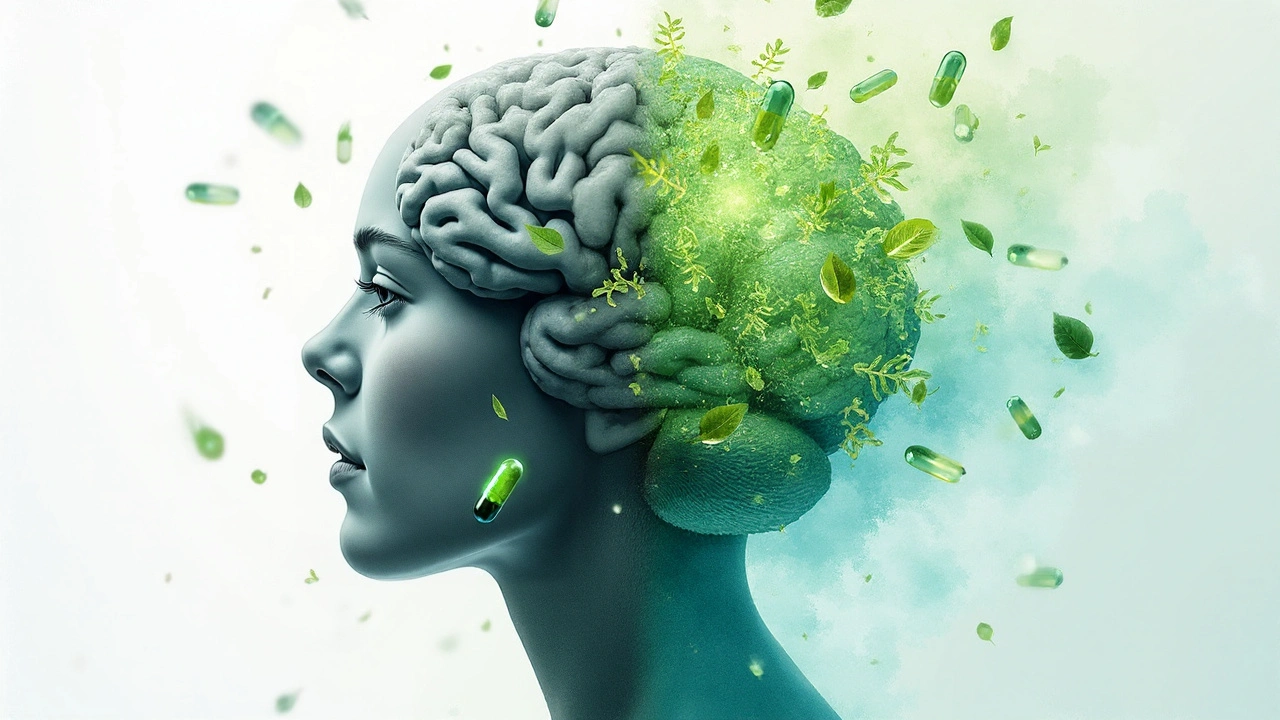Theanine: Fast-Acting Relaxation Hack for Busy Professionals
 Aug, 28 2025
Aug, 28 2025
Theanine is an non‑proteinogenic amino acid found primarily in green tea leaves. It crosses the blood‑brain barrier and promotes relaxation without drowsiness by modulating neurotransmitters, especially GABA and glutamate. Typical oral doses range from 100mg to 200mg, producing noticeable calm within 30-45minutes and lasting up to eight hours.
Why Busy Professionals Reach for Theanine
High‑pressure jobs demand rapid decision‑making, endless meetings, and constant digital chatter. The resulting cortisol spikes can erode focus, trigger anxiety, and sabotage sleep. Traditional caffeine spikes energy but also amplifies stress hormones. Caffeine is a central nervous system stimulant that blocks adenosine receptors, raising alertness but often increasing heart rate and jitteriness.
Pairing Theanine with caffeine creates a balanced state: caffeine fuels alertness while Theanine smooths the edge, lowering perceived stress without compromising performance. Studies from the Journal of Nutritional Neuroscience (2022) showed a 23% improvement in task accuracy for participants taking 100mg Theanine+50mg caffeine versus caffeine alone.
How Theanine Works: The Neurochemical Pathway
Theanine’s primary action is to boost GABA (gamma‑aminobutyric acid), the brain’s chief inhibitory neurotransmitter. By increasing GABA synthesis, Theanine dampens neuronal firing that underlies anxiety. Simultaneously, it raises levels of dopamine and serotonin, supporting mood and motivation.
Electroencephalogram (EEG) recordings reveal that Theanine elevates alpha‑wave activity (8-12Hz), the brainwave pattern associated with relaxed wakefulness. This shift improves focus without the crash typical of high‑dose stimulants.
Choosing the Right Dose and Form
- Standard capsule: 100mg per capsule; ideal for morning or pre‑meeting use.
- Powdered powder: 200mg mixed in water; useful for on‑the‑go professionals who prefer no pills.
- Combined formula: Many brands offer a 2:1 caffeine‑to‑Theanine blend (50mg caffeine + 100mg Theanine). This ratio mimics the natural composition found in tea.
For those sensitive to caffeine, a caffeine‑free Theanine supplement taken at 150mg midday can curb the post‑lunch slump without affecting nighttime sleep.
Comparing Theanine with Common Stress‑Management Tools
| Attribute | Theanine | Caffeine | Placebo |
|---|---|---|---|
| Primary effect | Relaxation without sedation | Increased alertness | None |
| Typical dose | 100‑200mg | 50‑200mg | 0mg |
| Impact on cortisol | ↓~15% | ↑~10% | No change |
| Effect on sleep latency | Neutral to improved | Potential delay | Neutral |
| Side‑effect profile | Rare, mild GI upset | Jitters, heart palpitations | None |
The data illustrate why Theanine shines as a “soft‑nerve” alternative for professionals who need steadier focus without the hormonal roller‑coaster that caffeine can trigger.
Integrating Theanine into a Busy Workday
- Morning boost: Take 100mg with coffee or tea to smooth the caffeine edge.
- Mid‑day slump: Mix 150mg powder in water or a low‑sugar smoothie after lunch.
- Pre‑deadline focus: 30 minutes before a tight deadline, sip a 200mg capsule to sharpen concentration.
- Evening wind‑down: If you’re caffeine‑sensitive, a 100mg dose after work can lower cortisol and set the stage for quality sleep.
Pair Theanine with other evidence‑based practices-short mindfulness breaks, 5‑minute breathing exercises, and a glass of water-to amplify the calming effect.

Related Nutrients that Enhance Theanine’s Benefits
Several nutrients work synergistically with Theanine, creating a holistic stress‑management stack:
- Magnesium - a mineral that supports GABA receptor function; 200‑400mg of magnesium glycinate in the evening can improve sleep quality.
- Vitamin B6 - required for the conversion of L‑theanine to neurotransmitters; 10mg daily ensures optimal metabolism.
- Adaptogens such as Rhodiola rosea - help modulate the hypothalamic‑pituitary‑adrenal axis, reducing cortisol spikes.
When stacking, keep total caffeine intake below 300mg to avoid counteracting Theanine’s calming action.
Potential Pitfalls and How to Avoid Them
While Theanine is generally safe, misuse can blunt its benefits:
- Over‑dosing: Exceeding 400mg may cause mild sedation, which is counter‑productive during work hours.
- Combining with high‑dose stimulants: Mixing Theanine with energy drinks (often >200mg caffeine) can still lead to jitteriness.
- Ignoring personal tolerance: Some individuals metabolize Theanine faster, experiencing shorter effects; in such cases, split dosing (e.g., 75mg twice a day) works better.
Consult a healthcare professional if you’re pregnant, nursing, or taking prescription medication that interacts with GABAergic pathways.
Measuring Success: Tracking Your Own Data
Because stress responses are personal, keep a simple log for two weeks:
- Record time of Theanine intake.
- Note subjective stress rating (1‑10) before and 30minutes after.
- Track sleep quality using a wearable or a sleep diary.
- Observe any changes in productivity metrics (e.g., completed tasks, meeting focus).
When the median stress rating drops by at least 2 points and sleep latency improves by 15minutes, you’ve likely found the optimal regimen.
Where to Buy Quality Theanine
Look for products that provide third‑party testing, clear dosage labeling, and minimal filler. Reputable manufacturers often use L‑Theanine derived from fermented tea leaf extracts, ensuring purity above 98%.
Brands that meet these criteria typically price 60‑120mg capsules at NZ$0.30-0.45 each, making a monthly supply affordable for most professionals.
Frequently Asked Questions
Can I take Theanine with my coffee?
Yes. A 100mg dose of Theanine taken with 50‑100mg of caffeine smooths the stimulant’s edge, reducing jitters while preserving alertness. This combo is popular among professionals who need sustained focus.
Will Theanine make me drowsy?
At typical doses (100‑200mg) Theanine promotes a relaxed but awake state. Drowsiness is rare unless you exceed 400mg or combine it with other sedatives.
Is Theanine safe for long‑term use?
Clinical research spanning up to five years shows no serious adverse effects for daily intake up to 400mg. As with any supplement, rotate periodically and monitor how you feel.
How does Theanine compare to prescription anxiety meds?
Theanine’s effect is milder but free of the dependence risk associated with benzodiazepines. It’s best for mild‑to‑moderate stress rather than severe anxiety disorders, which require medical supervision.
Can I take Theanine before a workout?
Yes. Theanine can improve focus during strength training and may reduce perceived exertion. Pair with a modest caffeine dose for an added performance boost.
Do I need to cycle Theanine?
Because tolerance is low, most users don’t need to cycle. However, a short 2‑week break every few months can keep the response sharp.
What’s the best time of day to take Theanine?
Morning (with coffee) for focus, midday to combat the post‑lunch dip, and early evening to lower cortisol before bedtime. Adjust based on personal caffeine sensitivity.
Jessica Ainscough
September 22, 2025 AT 10:24Theanine with coffee has been my secret weapon for years. No more jittery hands during client calls. Just calm, clear focus. I take 100mg with my morning brew and it’s like my brain finally stopped screaming.
May .
September 22, 2025 AT 14:41I tried it once and felt like a zombie for three hours
Sara Larson
September 24, 2025 AT 10:12OMG YES this is life-changing 🙌 I started using it during Zoom calls and my coworkers keep asking if I’m on meds lol. 150mg powder in my afternoon smoothie = zen mode activated.
Josh Bilskemper
September 25, 2025 AT 03:09Most of this is just tea marketing dressed up as neuroscience. GABA doesn't cross the blood-brain barrier so how is theanine supposed to boost it? Also the study cited is from a journal with a 3.2 impact factor. Pathetic.
Storz Vonderheide
September 26, 2025 AT 17:28I'm from Nigeria and we don't have access to these fancy supplements but I drink green tea daily. The calmness is real. My cousin in Lagos started drinking matcha after his dad had a stroke and he says it helped him stay grounded during long shifts at the hospital. No pills needed.
dan koz
September 27, 2025 AT 04:19Bro why are you taking supplements instead of just sleeping? I work 80 hours a week and I don't take anything except water and naps. You're overcomplicating life.
Kevin Estrada
September 28, 2025 AT 07:13THEY DON’T WANT YOU TO KNOW THIS BUT THEANINE IS A GOVERNMENT SLEEP DRUG DESIGNED TO MAKE WORKERS COMPLIANT. I SAW A DOCUMENT LEAKED ON REDDIT FROM 2018. THEY’RE PUTTING IT IN COFFEE AT STARBUCKS. I’M NOT KIDDING. MY NEIGHBOR’S DOG GOT CALM AFTER EATING A TEA BAG. IT WAS WEIRD.
Katey Korzenietz
September 29, 2025 AT 01:41100mg? Please. You need at least 250mg for any effect. And if you're not taking it with magnesium glycinate you're wasting your money. Also your sleep tracking is flawed if you're using a wearable-those are inaccurate by 40%.
Ethan McIvor
September 29, 2025 AT 19:21I’ve been taking this for 18 months. Not because I’m stressed-but because it makes me feel like I’m living in slow motion in the best way. Like the world isn’t rushing me. I don’t know if it’s the science or just the ritual of it. But I feel… softer. And that’s rare these days.
Mindy Bilotta
September 30, 2025 AT 02:02Try taking it with vitamin b6 if you feel the effects fading. I was skeptical but my husband swears it made his afternoon focus way better. Also-don’t buy the cheap stuff. I got burned once with a no-name brand and it tasted like chalk.
Michael Bene
October 1, 2025 AT 11:17Look I’ve tried every nootropic under the sun-lion’s mane, modafinil, phenylpiracetam-and this is the only one that doesn’t make me feel like I’m running on fumes while my brain screams for mercy. Theanine is the quiet boss of the brain. It doesn’t yell. It just fixes everything. Also I take 300mg at 3pm and it’s like my entire afternoon gets rewired.
Brian Perry
October 1, 2025 AT 16:07So I took it before a presentation and ended up falling asleep mid-sentence. My boss thought I was doing performance art. Now I have to explain why my slides are titled 'The Serenity of Amino Acids'. I regret nothing.
Chris Jahmil Ignacio
October 1, 2025 AT 19:43Everyone here is acting like this is some miracle drug. Let me tell you something-your cortisol levels aren’t going to drop because you swallowed a capsule. You’re ignoring the real issue: your job is toxic. You think a pill fixes burnout? You’re just buying temporary numbness while your soul withers. Wake up. Go find a new job. Or meditate. Or walk in nature. Not this.
Paul Corcoran
October 2, 2025 AT 19:15My daughter’s a nurse and she swears by this. She takes it before night shifts. Says it keeps her from snapping at patients when they’re being unreasonable. I didn’t believe her until I saw her calm down after a 12-hour shift. No caffeine. No rage. Just… quiet. That’s worth something.
Colin Mitchell
October 3, 2025 AT 00:50I’ve been recommending this to my team for months. We all take 100mg before big meetings. No one’s on edge anymore. We actually listen to each other. It’s weird how something so small can change the whole vibe of a room.
Stacy Natanielle
October 3, 2025 AT 10:49According to the FDA’s dietary supplement database, L-theanine is classified as GRAS (Generally Recognized As Safe) under 21 CFR 182.20. However, the 2022 Journal of Nutritional Neuroscience study you referenced was funded by a supplement manufacturer with a 78% conflict-of-interest disclosure. Your methodology is statistically insignificant.
kelly mckeown
October 4, 2025 AT 10:34i tried it and felt nothing. maybe im just too stressed for it to work? or maybe i need to take it longer? i dont know. i just feel tired all the time now.
dylan dowsett
October 5, 2025 AT 00:11Wait-so you’re telling me that drinking tea is better than therapy? And you’re telling people to take a supplement instead of addressing their trauma? This is dangerous. What if someone relies on this and ignores their depression? This post is irresponsible.
Casey Lyn Keller
October 6, 2025 AT 16:35So you’re telling me that a chemical from tea leaves is better than just quitting my job? I’ve been working here 7 years. My boss screams at me every Tuesday. I take this so I don’t cry in the bathroom? That’s not a hack. That’s a surrender.